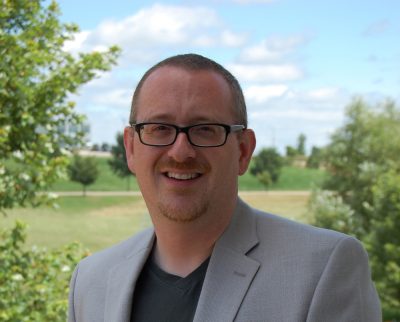If you want to know just how far Rochester’s entrepreneurial community has come in a few short years, ask Jamie Sundsbak.
As a Senior Program Coordinator at the Mayo Clinic and the founder of BioAM, a meet-up group for bio-business startups in southern Minnesota, Sundsbak says Rochester has “come a long way.”

“I know that many people don’t see that, but for those of us in the trenches, it has been a monumental shift,” Sundsbak told Destination Medical Center in a recent interview. “I have worked with fantastic people from all over the city who share a fantastic entrepreneurial vision and who have worked tirelessly to expand our ecosystem.”
Sundsbak is about to undergo his own professional shift. After more than a combined 12 years working in numerous roles on Mayo’s research endeavors, Sundsbak is moving just a few blocks away to launch Collider, a new business incubator in Discovery Square that will advance Rochester’s reputation as a destination for med-tech and biotech start-ups.
Sundsbak sat down with DMC to talk about Collider, Discovery Square, and where he sees Rochester in 10 years.
DMC: Tell us about Collider: what type of businesses do you hope to attract and what will startups gain from being in the space?
Sundsbak: First, Collider is a community organization that supports existing and future entrepreneurs. You don’t have to be a member of our physical space to be a part of the Collider Community; it’s open to anyone interested in helping to grow our entrepreneurial ecosystem.
Collider is also a physical location that we are calling Collider Core, and we want to meet with anyone who has an idea or who is building a business. Core will provide space, training, and mentorship, and leverage our collective connections to help remove barriers for businesses.
Core is also interested in partnering with companies and organizations beyond Rochester that want an “outpost” here. Initiatives like DMC have put Rochester on the radar of many companies that want to work with our largest employers or bring new industries or services to our area for the first time.
DMC: Collider’s location is in Discovery Square, a cornerstone of DMC’s efforts to develop an entrepreneurial ecosystem in Rochester. What do you think of the Discovery Square concept?
Sundsbak: I spent from 2001-2006 from Salt Lake City, Utah involved in their entrepreneurial ecosystem. They had a massive tech park spinning out new businesses based on research from the University of Utah and a welcoming and supportive community.
When I returned to Rochester in 2006, I was sure that Rochester would have done the same. I was wrong. To stay competitive and relevant we need Discovery Square. I have been so impressed by the great amount of thought that has gone into Discovery Square so far. Once we see buildings and businesses fill Discovery Square, we won’t just be competitive, we will be ahead of the game.
DMC: How do you think businesses can benefit from having a major medical player right next door?
Sundsbak: Mayo brings an advantage that few places have, which is a world-class medical institution in a relatively small city. Healthcare is at a tipping point and disruptive change in health care is one of the biggest challenges of this century. Smart companies know that, in order to revolutionize health care, they will need strong partners like Mayo Clinic to help them succeed. Our advantage over places like Boston and San Diego is our emerging ecosystem; at the moment, the barrier to entry and access is lower here. The amazing thing about Rochester is everyone wants to help. This is our greatest asset.
DMC: Through Mayo and through BioAM, you’ve been working within Rochester’s innovator/entrepreneur community for over five years. How has this ecosystem changed since you came to Rochester? What’s improved and what still needs work?
Sundsbak: I have found that the closest entrepreneurial ecosystem to our own is Kansas City. Entrepreneurship began to thrive there only when there was buy-in from everyone. Government, large corporations, and entrepreneurs all had to be on the same page and work to help each other succeed. I think we have that opportunity with DMC and Discovery Square.
DMC: Get out your crystal ball: in ten years, what will Rochester look like from the entrepreneurial perspective? Why will innovators stay in Rochester and why will the experience here be different compared to other tech hubs, like Palo Alto or Boston?
Sundsbak: I hope our largest employers will continue to open themselves to spinning out new companies as well as working with emerging and “outpost” companies here in Rochester. I believe that this is our biggest competitive advantage.
Achieving a diversified economy is another really important factor in the next decade. We need to see more companies that don’t have ties to the medical space emerge in Rochester, such as in the food and services industries.
Solid investments in education are necessary, too. We need to have curriculum for kids AND adults that keep us at the forefront of late 21st century jobs and skills. Most of all, we need to give our kids permission to be innovative and foster risk-taking in them.
We will never be Palo Alto or Boston, and we shouldn’t try to be. We have to be something those great innovations centers don’t have. One day, we will stop trying to be the ‘Silicon Valley of…’ and create our own successful path. That’s the vision that entrepreneurs, DMC, and Discovery Square should be rallying around – that’s our legacy.